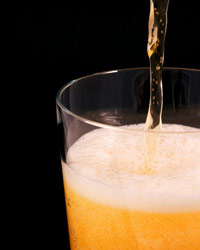Early Drinkers More Likely to Use Alcohol to Cope With Stress

The earlier people first begin drinking, the greater their chances of using alcohol as a coping technique to deal with stress later in life, a new study finds.
Researchers followed a group of 306 German children at risk for alcohol abuse (they had been followed from infancy as part of a larger study) and questioned them as teenagers and again at age 22 about their alcohol use. Among those who had a larger-than-usual number of stressful life events, those who had their first drink at age 13 or earlier consumed more than twice as much alcohol in the month before the survey compared to their counterparts who started drinking later in life.
"We found that the impact of stressful life events on drinking behavior depends on the age at first drink," Dorothea Blomeyer, a senior researcher at the Central Institute of Mental Health in Mannheim, Germany, said in a statement. "The earlier they start with alcohol use, the stronger the association between life stress and drinking in young adults."
She noted that this trend held for total alcohol consumed, but not for the number of days the young people drank, which she said fits the pattern of stress-related drinking. These people may drink more in quantity, but not necessarily on more occasions.
Blomeyer's co-author, Rainer Spanagel, a professor of pharmacology at the University of Heidelberg, noted that the relationship between an early age of first drink and stress-related drinking "seemed to occur only when individuals suffered from stressful life events such as severe job problems, but not after daily hassles that produce an everyday stress load."
While the reason for the connection is unclear, Blomeyer told MyHealthNewsDaily, "It could go back to physiological effects of the alcohol, priming the developing brain and its reward circuits and making it very rewarding to drink alcohol under stressful circumstances. This stronger reinforcement could result in a preference for alcohol drinking as [a] stress coping strategy."
Most studies in this area have come from one-off surveys, but this study added extra strength to the connection because it followed the children over time, Ralph Hingson, director of the National Institute on Alcohol Abuse and Alcoholism's division of epidemiology and prevention research, told MyHealthNewsDaily.
Get the world’s most fascinating discoveries delivered straight to your inbox.
"Overall, it was a good study," said Hingson, who was not involved in the research. "They did about as well as you could do in setting up this kind of study."
One potential limitation to the findings, he noted, was that stress may cause alcohol use and vice versa, so the cause and effect relationship was not clear.
"It could be a circular or reciprocal relationship that's going on," said Hingson.
Interventions, either to teach stress management or to delay a person's first drink, may be able to curb the problem.
"In the high-risk group of those with early drinking onset, teach constructive coping strategies with stressful life events," Blomeyer said. She added, "From our study, both strategies should be promising — however, children with early [age of first drink] wouldn't necessarily need therapy, but stable life circumstances and coaching in active and useful coping strategies."
Hingson said delaying these children's first drink is probably the most feasible option, because the children often receive their first drink from their parents.
"Some parents feel that it's a good idea to let their young children drink at home under controlled circumstances," said Hingson. "Perhaps delaying access to alcohol would be a better approach, and certainly it's a doable thing."
Hingson noted that this provides an opportunity for policymakers to find ways to keep children from drinking early.
Some possibilities include not allowing people under 21 to serve alcohol, or to make it illegal for people under 21 to have alcohol in their system -- a policy in some states, where police can arrest people for being intoxicated, without witnessing the actual drinking. States could also consider prohibiting parents from serving alcohol to their children, Hingson said.
In the end, it remains to be seen if any of these steps will have the desired effect.
"There are a lot of next steps that I think can be pursued," said Hingson. "Making access to alcohol more difficult for young people is certainly an environmental intervention that is doable."
The study will appear in the June 2011 issue of the journal Alcoholism: Clinical and Experimental Research.
This article was provided by MyHealthNewsDaily, a sister site to LiveScience. Follow MyHealthNewsDaily on Twitter @MyHealth_MHND.



